I'M ONE TO TALK
Our Blog Posts will help you reach your full potential in becoming a confident conversationalist. New topics each week.
Personal Branding and Sports Fandom

Talking about the outcome of a game is part of being a sports fan. It's also part of your personal brand.
That might not matter so much if you only talk sports with your closest friends. As one of my Instagram followers pointed out, every fan can talk for hours about how terrible the NFL refs/officials have been in recent years.
Here's what I want to point out - if that conversation takes place at a sports bar, tail gate or game itself that's one thing. If it's taking place at work that is an entirely different story. Being emotionally invested as a fan can lead to emotional responses to outcomes, coaching decisions, play calls, etc... That type of response isn't necessarily the message you want to send to colleagues, managers or clients.
As a sports fan you can talk about sports however you want to, but understand you are talking about more than an outcome. If your sports narrative includes consistently blaming the officials for an unfavorable outcome, it's not hard to start...
What do you and LeBron James have in common?

You're both working toward a goal.
LeBron James is about to reach an NBA milestone and become the all-time leading scorer in NBA history. Your goal might not be as lofty, but you're still working toward one.
And here's where we can think outside the box scores and use a major sports headline as a way to check in with your own progress.
You don't have to be a basketball fan to recognize the name LeBron James. You don't have to care about his milestone, but I know you care about yours. So make it about you. Use sports as a trigger or reminder for tracking your own progress.
It's just one of the ways you can use sports conversations and sports fandom in productive ways at work.
Already a Sports Fan? Here's what you need to know about talking sports

It’s interesting the assumptions we make about sports fans. From what we think a sports fan looks like to how they should sound in a conversation. To me, the most interesting assumption is that sports fans don’t need any help in talking about sports.
Just because you know sports doesn’t mean you’re using it to your advantage – or in a way that won’t alienate others at work.
I frequently see articles or resources on how to talk sports if you’re not a sports fan. Heck, I’ve been quoted in those articles, written books and created resources around that. There’s an assumption that if you’re already a fan you don’t need help talking about sports, but there are things you’re missing.
As a lifelong sports fan and a 22-year sports broadcasting veteran I talk sports for a living and spend a lot of time around people who enjoy sports and talk sports. For as much as I enjoy those conversations, most of the sports fans I encounter have a very narrow view of sports talk.
If stats, scores and o...
Talk Sporty 101: No shame in the game
You can be a sports fan for lots of different reasons. It doesn’t have to be because you played sports in high school or because you’ve always been a fan or because your entire family cheers for the Chicago Bears.
You could be a sports fan because it’s a way to connect with will colleagues, it’s a topic your kids will talk about, because you love tailgating or because you think the athletes look good in their uniforms.
There’s nothing to be ashamed of. Your fandom your reasons.
There are three things to remember:
- When you encounter a sports bully who tries to make you feel bad for not being as much of a fan as they are, stick to your guns. You don’t owe them an explanation or an excuse as to why you’re a fan or how long you’ve been a fan. There’s no right or wrong way to be a fan. (Although I’d argue being a bully defeats the purpose of using sports to create community.)
- Get comfortable with what you are most comfortable talking about. I call it defining your area of expertise. ...
Sports Conversation Starters for Your Workweek
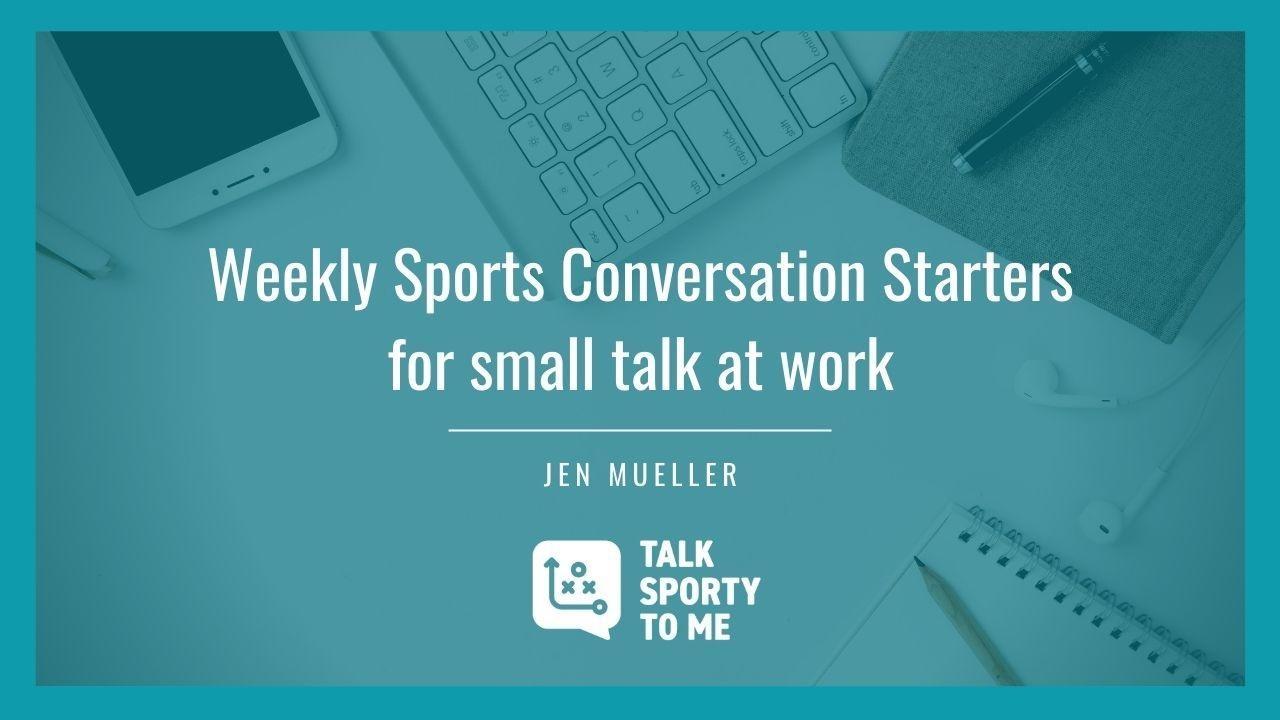
Conversations rarely have all or nothing results, particularly when we’re talking about small talk.
Each exchange gets you a little closer to building a relationship, or communicating a little better, or opening the lines of communication.
Re-setting the expectations for each conversation can help you see short conversations as productive ones. Those interactions can be about sports and these #ConvoStarters can get the ball rolling.

Sports Conversation Starters for Your Workweek

I was about 13 when I wrote a letter to my favorite sportscaster in Houston. I told her how much I loved the work she did and how I thought it would be so cool to talk to players. Much to my surprise, she responded. She was gracious and encouraging of my interest in sports broadcasting but it’s these words that made the greatest impression, “Athlete are people too.”
It was a little puzzling to hear that as a teenager, but it’s a phrase, a statement and a truth that has driven every interaction I’ve had with athletes for 20 years. It’s easy to see athletes as superheroes or super-human based on their talents and abilities, but at the end of the day they’re people.
I’ve heard from plenty of sports fans who want athletes to “stick to sports.” That would be like me telling you to “stick to your job, because what do you know about sports?”
You don’t have to agree with what athletes say. You probably don’t agree with everything your boss or your friends say – but at the end of the day the...
Sports Conversation Starters for Your Workweek
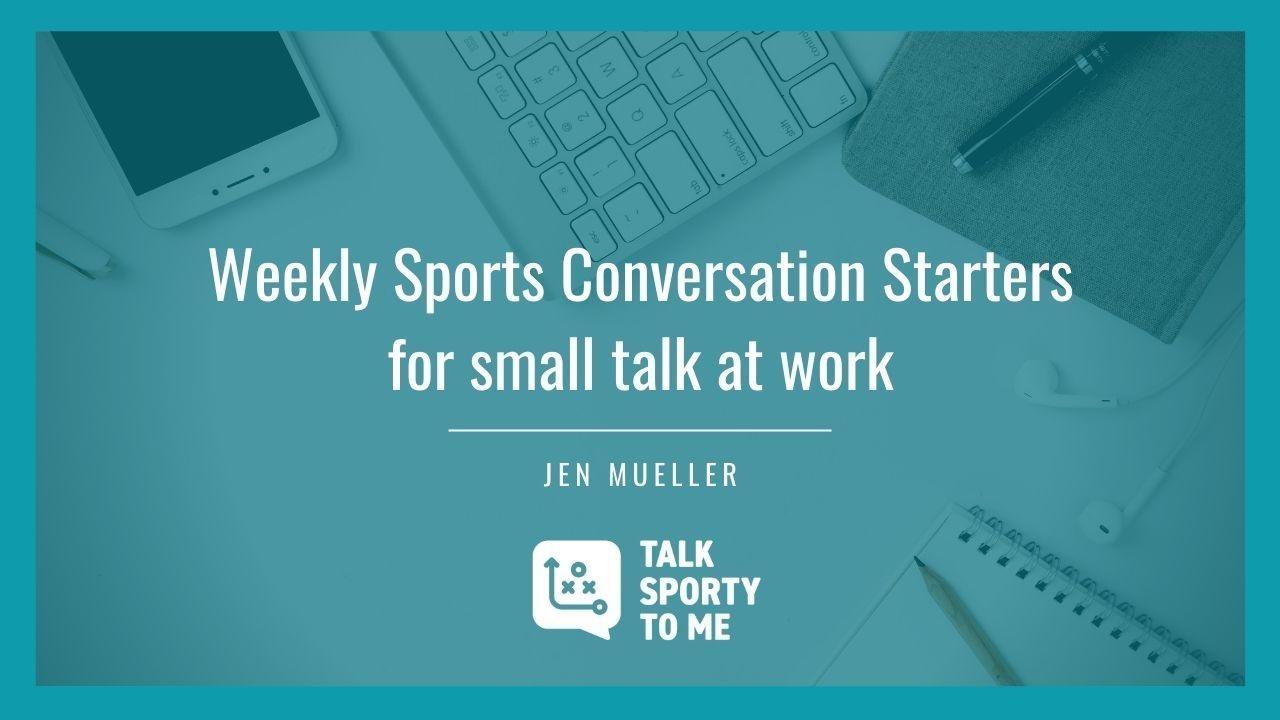
There's a reason you’ve probably been told to “keep it simple” at some point. It's a reminder not to overthink or overcomplicate the process or the idea.
The advice gets doled out when making goals you actually want to keep, when problem-solving, presenting new ideas, creating new products and even decorating your house.
Here’s another spot to keep it simple – sports small talk.
Small talk with colleagues is not the time to overthink or prove how much you know. Small should be a relationship building activity. You need to be present and engaged in those moments. Keep the conversation starters simple – that doesn’t mean boring - so you can fully engage in what your colleague is saying instead of coming up with your best retort or comeback.
These weekly sports #ConvoStarters are made for that purpose. There’s just enough information for you to engage in a short conversation that simply helps you build relationships.

Sports Conversation Starters for Your Workweek
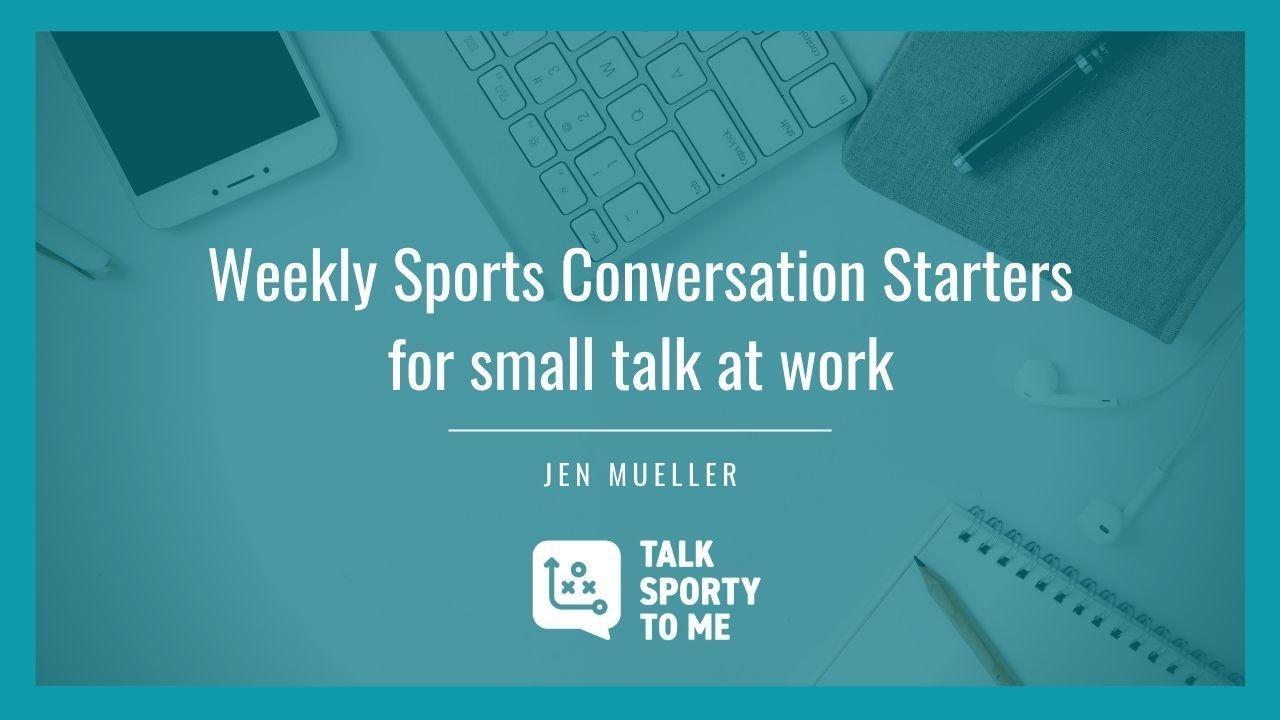
Among the many headlines I read in the last week this one stands out:
“The coronavirus has killed water-cooler chatter but it’s a key skill for business and happiness.”
Here’s the basic premise – no chitchat leads to feeling less connected to colleagues, less productivity and reduced social skills.
Small talk is, in fact, critical to business.
It’s one of the reasons I’ve committed to providing weekly sports conversation starters every week for the last 11 years.
Here’s a list of topics you can use this week.

Sports Conversation Starters for Your Workweek
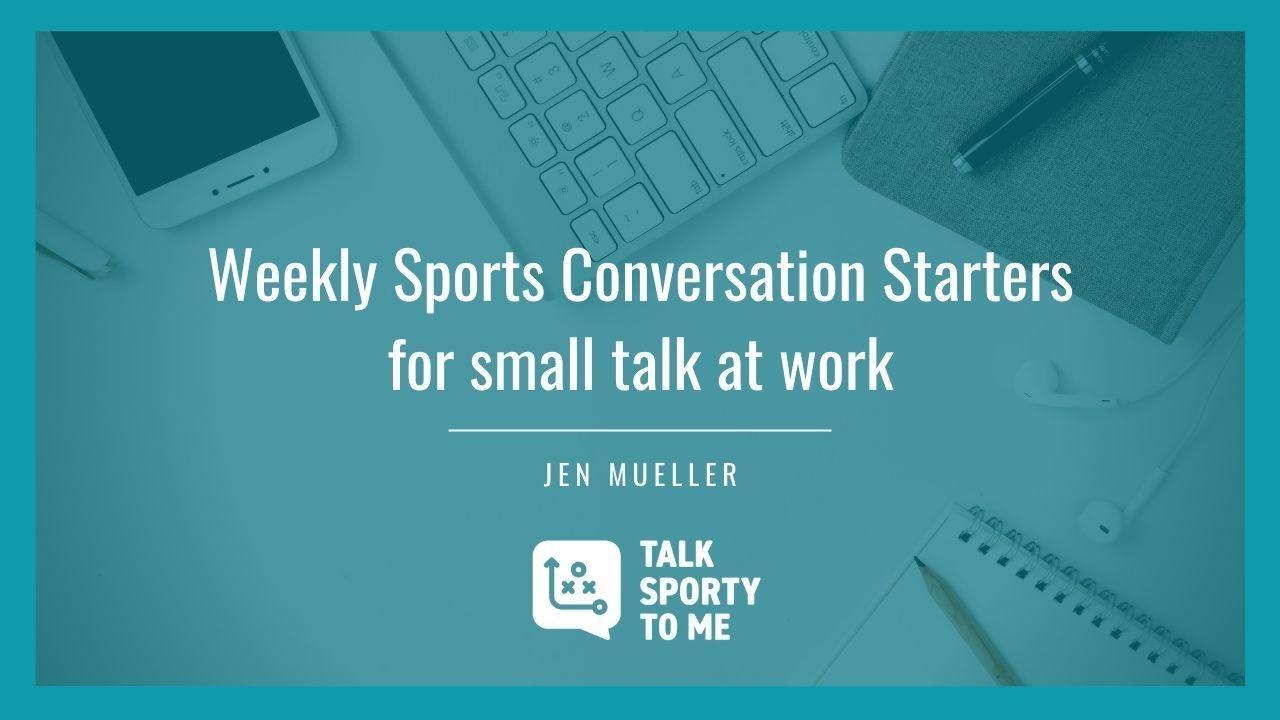
Build relationships before you need them.
I offered that piece of advice to college students starting their careers in sports broadcasting. I can’t only talk to an athlete, coach or executive is when I need something and expect them to open up, share their perspective or give me any answer at all. If I don’t put relationships first they will be more likely to turn and walk the other way when they see me coming instead of giving me a warm greeting and insightful answers.
The need for tough conversations and thoughtful discourse won’t go away. Those conversations can get easier if you build relationships along the way. You don’t have to start with the tough conversation. You can start with small talk.
And those small talk conversations can start with sports, like these topics making news this week.
Sports Conversation Starters your Your Workweek
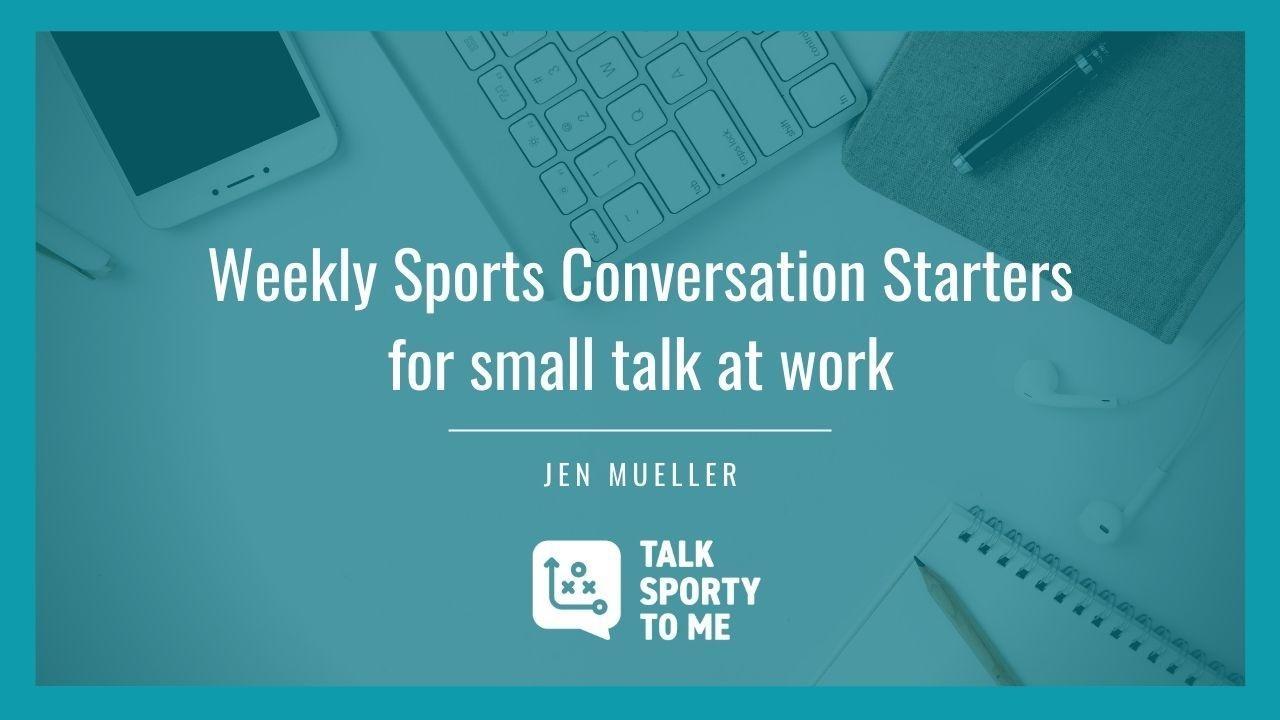
Small talk isn’t just about being polite or finding something to say before a meeting starts. It’s the beginning of conversation that could unlock creativity, new ideas or inspiration.
Those are all things that could be lacking while working from home. If you’re missing some of your mojo. If ideas aren’t coming to you as easily as they once did, try having a conversation with someone else. It doesn’t even need to be about work or the problem you’re trying to solve.
One comment can lead to a different thought and a way to unlock your mojo and creativity.
If you’re looking for small talk topics this week, try these sports headlines.



